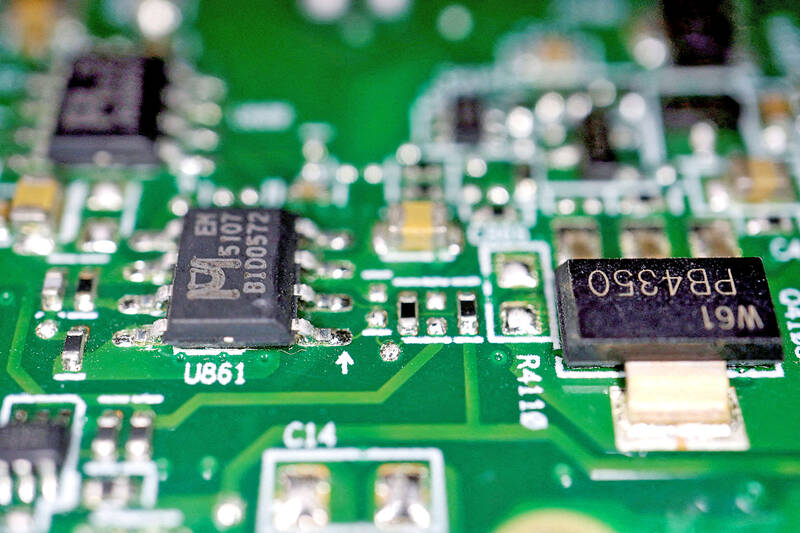Tokyo Electron Ltd reaffirmed its annual outlook and outlined plans to build a ¥104 billion (US$683 million) plant, suggesting it expects sustained spending on artificial intelligence (AI).
The company, one of a handful of key chip gear makers globally, revealed the expansion plans after posting better-than-expected earnings. The Japanese supplier to Taiwan Semiconductor Manufacturing Co (TSMC, 台積電) and Samsung Electronics Co brought in operating profit of ¥199.6 billion in the fourth quarter last year from sales of machines used to prepare, etch and clean silicon wafers that are ultimately cut into memory or logic chips. That was up 51 percent from the previous year and compares with the average of analyst estimates of ¥174 billion.
Closely watched as an indicator of spending on chips used for AI development, Tokyo Electron did not hike its outlook, as compatriot Advantest Corp did a week earlier. Indications from supply chain players have been mixed, as Dutch lithography supplier ASML Holding NV reported a surprisingly high number of orders, while Arm Holdings PLC and Advanced Micro Devices Inc gave cautious forecasts that added to doubts about the sustainability of the free-spending trend in the market.

Photo: Reuters
Tokyo Electron’s move to expand capacity with a plant in Miyagi Prefecture reflects demand from customers such as TSMC, Samsung and SK Hynix Inc, which have indicated they would continue elevated spending on tools used to process wafers into semiconductors.
Much of the investment this year would come from cutting-edge logic makers and high-bandwidth memory makers hurrying to meet AI server demand, Tokyo Electron chief executive officer Toshiki Kawai said on an earnings call.
That is while the company expects a lull in chip gear purchases by Chinese customers, especially among new entrants to chipmaking, Kawai said.
China is expected to comprise a percentage in the mid-30s of Tokyo Electron’s sales in the business year starting in April, down from more than 40 percent in the current fiscal year, he said.
“We can’t deny that we’ve been affected” by US restrictions on exports of chip-related technologies and other geopolitical factors, Kawai said.
Chinese start-up DeepSeek’s low-cost and open-source AI model is raising concern that the tech sector faces far more price competition and less revenue than previously predicted. Still, AI industry leaders have argued that cheaper AI models would mean more new entrants that would further support demand for AI infrastructure over the long term.
Tokyo Electron is still evaluating DeepSeek and its impact, finance division officer Hiroshi Kawamoto said.
If lower-cost AI leads to an expansion of the market, it is a positive, Kawamoto said.

TARIFFS: The global ‘panic atmosphere remains strong,’ and foreign investors have continued to sell their holdings since the start of the year, the Ministry of Finance said The government yesterday authorized the activation of its NT$500 billion (US$15.15 billion) National Stabilization Fund (NSF) to prop up the local stock market after two days of sharp falls in reaction to US President Donald Trump’s new import tariffs. The Ministry of Finance said in a statement after the market close that the steering committee of the fund had been given the go-ahead to intervene in the market to bolster Taiwanese shares in a time of crisis. The fund has been authorized to use its assets “to carry out market stabilization tasks as appropriate to maintain the stability of Taiwan’s

STEEP DECLINE: Yesterday’s drop was the third-steepest in its history, the steepest being Monday’s drop in the wake of the tariff announcement on Wednesday last week Taiwanese stocks continued their heavy sell-off yesterday, as concerns over US tariffs and unwinding of leveraged bets weighed on the market. The benchmark TAIEX plunged 1,068.19 points, or 5.79 percent, to 17,391.76, notching the biggest drop among Asian peers as it hit a 15-month low. The decline came even after the government on late Tuesday authorized the NT$500 billion (US$15.2 billion) National Stabilization Fund (國安基金) to step in to buoy the market amid investors’ worries over tariffs imposed by US President Donald Trump. Yesterday’s decline was the third-steepest in its history, trailing only the declines of 2,065.87 points on Monday and

TAKING STOCK: A Taiwanese cookware firm in Vietnam urged customers to assess inventory or place orders early so shipments can reach the US while tariffs are paused Taiwanese businesses in Vietnam are exploring alternatives after the White House imposed a 46 percent import duty on Vietnamese goods, following US President Donald Trump’s announcement of “reciprocal” tariffs on the US’ trading partners. Lo Shih-liang (羅世良), chairman of Brico Industry Co (裕茂工業), a Taiwanese company that manufactures cast iron cookware and stove components in Vietnam, said that more than 40 percent of his business was tied to the US market, describing the constant US policy shifts as an emotional roller coaster. “I work during the day and stay up all night watching the news. I’ve been following US news until 3am

TARIFF CONCERNS: The chipmaker cited global uncertainty from US tariffs and a weakening economic outlook, but said its Singapore expansion remains on track Vanguard International Semiconductor Corp (世界先進), a foundry service provider specializing in producing power management and display driver chips, yesterday withdrew its full-year revenue projection of moderate growth for this year, as escalating US tariff tensions raised uncertainty and concern about a potential economic recession. The Hsinchu-based chipmaker in February said revenues this year would grow mildly from last year based on improving supply chain inventory levels and market demand. At the time, it also anticipated gradual quarter revenue growth. However, the US’ sweeping tariff policy has upended the industry’s supply chains and weakened economic prospects for the world economy, it said. “Now